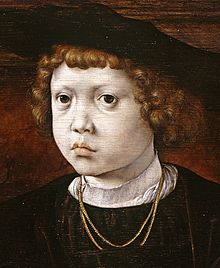"Prince John of Denmark" redirects here. For other Danish princes named John, see John of Denmark (disambiguation).
| John of Denmark | |
|---|---|
 Portrait by Jan Mabuse, 1526 Portrait by Jan Mabuse, 1526 | |
| Born | 21 February 1518 Copenhagen, Denmark |
| Died | 11 August 1532(1532-08-11) (aged 14) Regensburg, Bavaria |
| Burial | St. Peter's Abbey, Ghent (1532–1883) St. Canute's Cathedral, Odense (since 1883) |
| House | Oldenburg |
| Father | Christian II of Denmark |
| Mother | Isabella of Austria |
John of Denmark (Danish: Hans; 21 February 1518 – 11 August 1532) was the eldest child of King Christian II and Queen Isabella of Denmark and Norway.
Biography
Born at Copenhagen Castle, John was named after his paternal grandfather, King John. When John was one year old, his mother gave birth to twin boys, Philip Ferdinand and Maximilian, who both died within a year. He also had two younger sisters, Dorothea, the future Electress of the Palatinate, and Christina, the future Duchess of Lorraine.
King Christian II was deposed in 1523 by his uncle, who took the throne as King Frederick I. During the years of their exile, John and his family led a relatively humble life in the city of Lierre (now Lier, Flanders, Belgium) in the Duchy of Brabant of the Habsburg Netherlands, waiting for the military help of John's maternal uncle, Holy Roman Emperor Charles V.
At the beginning of 1532, John's father went to Oslo in an attempt to persuade the Riksråd (National Council of Norway) to recognize John as the rightful Heir to the Throne and to afterwards crown him as the next King of Norway. Meanwhile, the Emperor took John to Regensburg, then a Free Imperial City in Bavaria. He was undoubtedly meant to play a role in Habsburg politics (as the eldest grandson of Philip the Handsome, though posthumous), but died on 11 August at Charles's house in Regensburg. He was buried in St. Peter's Abbey in Ghent, also in the Habsburg Netherlands, but his remains were exhumed and transported to St. Canute's Cathedral in Odense, Denmark, in 1883. He is portrayed as gifted and intelligent, capable of running a country.
Notes
| This article needs additional citations for verification. Please help improve this article by adding citations to reliable sources. Unsourced material may be challenged and removed. Find sources: "John of Denmark" 1518–1532 – news · newspapers · books · scholar · JSTOR (June 2020) (Learn how and when to remove this message) |
- Bricka (1887), p. 567.
- Bricka (1887), p. 566.
References
- Bricka, Carl Frederik, ed. (1887). Dansk biografisk leksikon (in Danish). Vol. VI. (Gerson - H. Hansen) (1st ed.). Copenhagen: Gyldendal.
External links
![]() Media related to John of Denmark at Wikimedia Commons
Media related to John of Denmark at Wikimedia Commons
- "The Children of Christian II, King of Denmark (1481-1559) [1526]". The Royal Collection. Retrieved 4 March 2018.